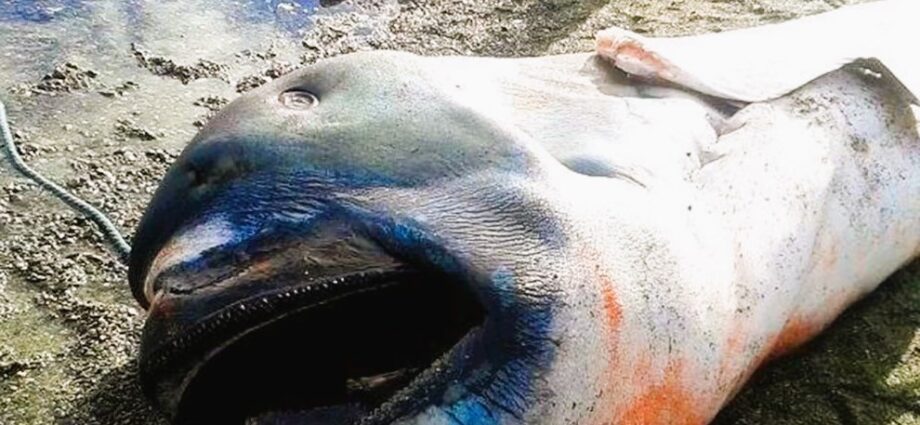A rarely seen megamouth shark (Megachasma pelagios) was recently spotted in east Africa for the very first time. It was recorded in a market in Zanzibar, where it was being sold after being captured and killed.
The recent sighting was only the sixth time a megamouth had ever been found off the coast of Africa. Marine biologist Rhett H. Bennett of the Wildlife Conservation Society explains the implications of the find.
What is the megamouth shark and why is it so rare?
The megamouth is a large-bodied shark found all over the world. Its name, megamouth, comes from its large mouth. Shaped a bit like a tadpole, with a huge mouth that takes up half its head, it was first discovered in 1976 when one got tangled up in a navy boat’s anchor chain in Hawaii. Since then, fewer than 280 megamouth sharks have ever been spotted anywhere in the world. There is not a lot known about this species.
Officially the megamouth has been recorded to reach 7 metres in length, slightly larger than a great white shark (which can reach 6.4m). However, most megamouth sharks recorded to date have been less than about 5.5m long. This is about the length of a tiger shark or the height of an adult giraffe.
People may confuse the megamouth shark with the megalodon, the big, prehistoric shark species that was said to be so much bigger than any other shark. But the megamouth is a gentle giant, with no large, sharp teeth. It cruises around quietly, similar to a whale shark.
It is not a top predator that feeds on tuna fish or marine mammals, but rather a filter feeder that feeds on plankton, and is the smallest of only three shark species in the world that are filter feeders. Megamouth sharks are hardly ever seen, which suggests it is likely a solitary type of animal.
What is known about the first megamouth seen in east Africa?
This megamouth shark was caught by an artisanal fishing vessel in Zanzibar’s waters, and then landed at a beach on Pemba Island. The shark was sold for about 43,000 Tanzanian shillings (US$17), probably for consumption in the local communities.
It was sad to see the photos of the dead animal laid out on the beach, but definitely an important new record. This was only the sixth megamouth ever seen in Africa, with one previous sighting each in South Africa, Gabon, Liberia, Senegal and Mauritania between 1995 and 2020.
As the only individual megamouth shark ever found along the east coast of Africa, this finding extends the areas of the world’s oceans in which the shark is known to live, filling what used to be a gap in its otherwise near-global distribution.
My colleagues, Abdalla S. Abdulla of the Wildlife Conservation Society’s Tanzania Marine Programme and David van Beuningen of the Wildlife Conservation Society’s Western Indian Ocean Shark Programme, and I analyse thousands of photographs of dead sharks at landing sites, where fisheries offload what they have caught, including unwanted animals accidentally caught in their fishing gear.
We usually see the same 20 to 30 shark species over and over. So seeing the first megamouth ever in this area was a freak record – one of those rare occurrences and one of the most interesting we have had.
How can the shark be extremely rare, yet not endangered?
The megamouth shark is classified as a species of Least Concern on the International Union for Conservation of Nature’s Red List of Threatened Species because it is found all over the world. This means it is likely that its numbers are far greater than the 280 that people have recorded to date. The good news is that even these 280 sightings were not all captures by fishing boats. We conclude from this that fishing operations have minimal impact on the species currently. This may be because the animals use habitats not targeted by fishing vessels.
How can marine biologists research this rare creature?
The first ever pregnant megamouth shark to be found washed up in the Philippines in December 2023. It was 5.5m long and each of its unborn pups had been expelled from the mother’s body on the shore. This was the first scientific confirmation that the megamouth, like most sharks, gives birth to live young, as opposed to laying eggs.
In time, if multiple records of megamouths occurred in the same place, scientists might want to focus some dedicated research effort in that area. However, for our research programme in east Africa, we do not have the resources to pursue that in detail. We would be spending hours and hours in the ocean and might never find another megamouth. This is why it is important to share this kind of information, in order to contribute additional pieces to the megamouth puzzle.
Anyone who comes across a megamouth shark should notify any nature conservation or government fishery department, or make contact with the Wildlife Conservation Society, or the nearest aquarium.
(Abdalla S. Abdulla and David van Beuningen co-authored the original article on this research.)















